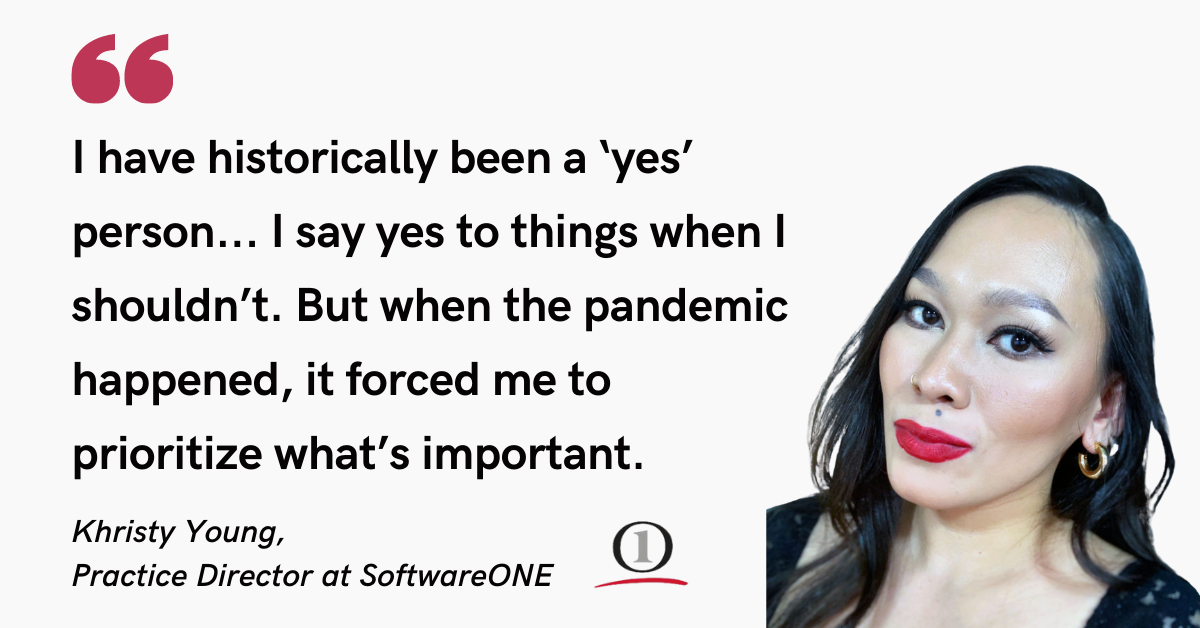Khristy Young is used to working hard.
She came to the U.S. from the Philippines at 19, computer science degree in hand, and landed her first job in tech, working in frontline support, at 21.
"I realized that for them to see past me being an immigrant and a woman, I had to be very competent. It sucks to say, but felt like I always had something to prove. Eventually, instead of worrying about what other people thought, I decided to show them what I could do," she explains. She dealt with coworkers who didn't listen to her and generally underestimated her, but she kept working to prove herself.
Khristy spent almost a decade at that company, eventually climbing the ranks into a coveted developer role, but left after her manager wouldn't give her a chance to become a team lead. "I realized I'd outgrown that job, and leaving it was almost like dating. I hadn't dated for nine years, and then all of a sudden I had to go out in the world again," she says.
A few months later, an old coworker suggested she join him at SoftwareONE, a leading provider of software and cloud solutions, including and especially Microsoft products. She came over and had to work to prove herself again, especially as her role was something new to her: consulting as a Microsoft partner. "I saw it as a gift. I'd never done that before, and I had the chance to learn it," says Khristy.
Once she got up to speed, she knew she'd made the right decision. Several years in, she's currently working as the Practice Director of their Future Workplace team with about 15 people—who she affectionately calls her "techies running around North America"—reporting to her as they advise clients on transitioning to the cloud and enable the technologies that allow for that. "One thing I like about SoftwareONE is that they recognize talent and diligence," she says. "Competencies speak more than words. So working for a company that appreciates self-starters is working really well for me."
But what do you do when competency isn't enough?
Khristy has been running up against that question for the first time in her career thanks to the pandemic. As SoftwareONE's cloud-based business is booming, she's found herself stretched thin, expected to run her team, take care of her two children, spend time with her partner, and not lose her mind along the way.
We sat down with Khristy this week to get her honest advice on what works and what doesn't when it comes to finding work-life harmony during a pandemic.
1. Learning to say no: the rule of three
Khristy's first piece of advice is something she's only just recently learned. "I have historically been a 'yes' person. People say I'm an overachiever," she explains. "I say yes to things when I shouldn't. But when the pandemic happened, it forced me to prioritize what's important."
Yes, that includes wellbeing and family and health, but Khristy is talking specifically about professional prioritization. "People don't realize we spend most of our time at work. I want people to value my time instead of just throwing stuff over the fence to me," she says.
To do that, she's adopted a hard and fast rule: she only focuses on three things at a time, and she says no to everything else.
Those three things could be updating her budget, checking in on team morale, and building next year's strategic plan, or any other set of priorities. The key is in keeping them limited to just three. "A friend told me that if you have more than three priorities, you're not really prioritizing anything. Ignoring something can take just as much energy as focusing on something, so you're better off saying no. I'm finding that's true. If I can meet those three, then I can make room for more," says Khristy.
2. Stay just the right amount of informed
Some people have been going on media diets during the pandemic, paring down the amount of news they consume each day. Not Khristy. She's found that staying informed through trustworthy channels, as in certain news and science outlets instead of social media, is allowing her to keep focused on why we're all making sacrifices.
"It puts into perspective why we're doing this, why we're in this situation, why we can't go out," she says. "It reminds you that things are not as bad as you think when you see the amount of people that are dying."
She keeps that perspective for herself—her kids are happy, healthy, and actually enjoying remote learning—and for her team, who are all employed (Khristy retooled her budget to avoid layoffs) and safe at home with their families.
3. Cater to you
"To find that balance between teacher, mom, and employee in the same place and with the same hours allocated is really hard," says Khristy.
"Being a mother, it's a very thankless job, and it's natural for us to cater to our kids, who are now always home. And then you also may have to cater to your partner, your husband, your boyfriend, whoever it may be. And we forget to cater to ourselves," she says. "That's when you get to that burnout factor, that pressing state of, 'Oh, God, I'm just exhausted.'"
Khristy suggests finding one activity, any activity—"It could be scrapbooking, it could be going to Target, it could be paint by numbers or yoga," she says—that is just for you. Something you can do alone and use as a bit of a retreat. "[Alone time] really resets my mind a little bit," says Khristy.
4. Take actual time off
Khristy knows what you're thinking: where are you going to go?
But just because you can't travel doesn't mean time off isn't worth it. Khristy says she used to travel up to two weeks each month for work and go on at least one fun trip around California or nearby states every few weeks pre-pandemic, but now she's learning how to take a different type of PTO.
"To be quite honest, even if you're just having those days where you're sitting on the couch and watching Netflix, taking time off really helps with a mental break," she says.
5. Draw new boundaries
Khristy's cue to turn off her work brain used to be the sound of her partner opening the door after his work day. But now that everyone works from home, that boundary has disappeared. "My compass is all messed up!" laughs Khristy.
Instead, she's learned to set new boundaries on her time and how she spends it. First, Khristy has committed to only working in her office. "When I'm there, I work. Anything outside [of that space] is life," she says.
And for timing, she's made a new version of that dinnertime rule, setting it at a specific time versus waiting for her partner. When that time rolls around, she leaves her office and doesn't return until the next morning. In between, she hangs out with her kids and enjoys the new rituals they've set up to make pandemic life more fun, including Taco Tuesdays and Saturday movie nights.
6. Stay connected
Months into the pandemic, Khristy realized she was struggling to stay focused. To combat that, she reached out to her peers.
"If I feel like I'm not on an island by myself—if I know that there is purpose to what I'm doing, that it's moving the bigger needle somewhere—I feel like my time is worth something," she says. "Keeping in contact with peers across the business in all different verticals has helped with that."
Khristy stays in touch with catch-up calls and teamwide happy hours, which are focused on entirely random topics. "Last Friday we talked about cats and cat lady syndrome," she says, smiling. "It uplifts the team and reminds us that we're all fine. We ask how everyone is doing and we say, 'We're COVID good.'"
7. Remember that work is just work
"The saving grace," says Khristy of what keeps her able to balance her work and her family, "is remembering what I'm doing this for. In the end, I'm working for my family, to give them a better life. That's really the only reason."
Keeping that focus in mind allows Khristy to live within the work-life boundaries she's set up for herself, and she suggests others figure out what's driving them and rigorously protect that goal.
"Some people leverage work to get them out of their lives. I don't have that," says Khristy. "My life is really good outside of work. Knowing that I don't want to miss the moments that actually matter keeps me from spending too much time on work."
If you're looking to join Khristy in finding work-life harmony at SoftwareONE, check out their open roles.




